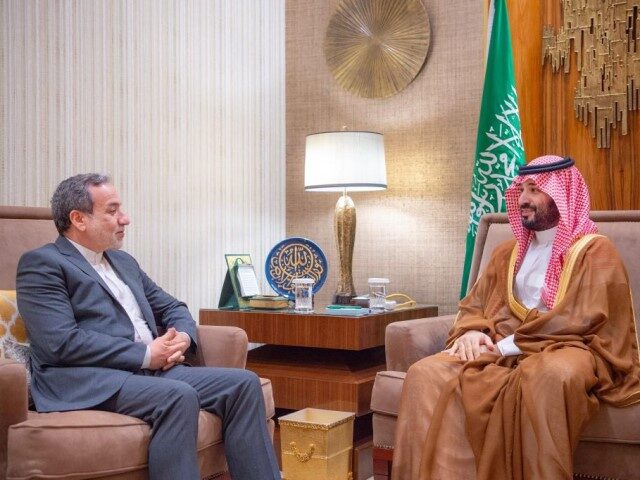Iranian Foreign Minister Abbas Araghchi traveled to Riyadh, Saudi Arabia, for high-level meetings on Wednesday intended to discuss how to stop Israel’s self-defense operations against Iran-backed terrorist organizations, Iranian media reported.
The Saudi Press Agency (SPA) confirmed on Wednesday that Araghchi met with his Saudi counterpart, Foreign Minister Prince Faisal bin Farhan, a meeting the Saudis described as necessary to discuss “bilateral relations and ways to enhance them.”
Iranian media reportedly the reason for the occasion differently, insisting the goal was “consultations and coordination” to “stop the regime’s [Israel’s] crimes.”
Iran is seeking to enhance “diplomatic efforts, in co-ordination with countries of the region, to stop the Israeli regime’s genocide and aggression and to alleviate the pain and suffering of our brothers and sisters in Gaza and Lebanon,” a Foreign Ministry spokesman insisted in a statement regarding Araghchi’s stop in Riyadh.
Iran’s Tasnim News Agency described the stop in Saudi Arabia as part of a larger campaign to pressure Muslim countries in the world to support Iran’s proxy war against Israel and its direct hostile actions towards the country. Araghchi also claimed that Iran is trying to help broker a “ceasefire acceptable to and agreed on by the resistance,” a term Iran uses for its network of jihadist terror organizations.
The meeting is notable because it will be the second high-level exchange between Iran and Saudi Arabia in a month – Iranian President Masoud Pezeshkian met with Prince Faisal in Doha, Qatar, last week – and because it follows a dramatic change in tone regarding Israel out of the Saudi government. A year ago, prior to the unprecedented Hamas attack on Israel on October 7, 2023, Saudi leaders were openly discussing the possibility of normalizing relations with Israel, as some other Gulf states have done.
The Trump-era Abraham Accords brought full normalization for Israel’s relationships with Bahrain and the United Arab Emirates (UAE), but that momentum stalled under current President Joe Biden, who prioritized treating the Saudi government, once an ally to America, as a “pariah” over the gruesome killing of Islamist journalist Jamal Khashoggi.
Biden attempted to undo the harm caused to the American-Saudi relationship with a visit to the country himself in 2022, but the damage appeared to be done and Saudi Arabia has since floated into the orbit of American enemies such as China and Iran.
China brokered a normalization deal between Tehran and Riyadh in early 2023 that restored ambassadors to their respective countries and allowed the anti-American BRICS coalition to extend both nations invites to join. Iran rapidly accepted, while Saudi Arabia has not yet completed the membership process.
The normalization agreement has united Iran and Saudi Arabia against the Israeli cause. The Israel Defense Forces (IDF) have launched a multi-pronged self-defense effort against a host of Iran-backed terror groups following October 7, including Hamas, Lebanese Hezbollah, and the Houthis of Yemen. Iran claims the operations against jihadist terrorists is a “genocide” against Muslim people in general and Palestinians and Lebanese in particular.
Araghchi was welcomed in Saudi Arabia a day after defending the atrocities of October 7, which Iran refers to as the “al-Aqsa Flood.”
The Saudi messaging on the meeting focused much more on bilateral ties between the two countries than on Israel, as it did when Pezeshkian met the Saudi foreign minister a week ago. Faisal declared that he wished to see Saudi Arabia and Iran “permanently close the chapter on our differences and focus on resolving issues, developing relations as two friendly and brotherly countries.”
On Israel, he added only, “We trust in your wisdom and insight in managing the situation and contributing to peace and stability in the region.”
The de facto leader of Saudi Arabia, Crown Prince Mohammed bin Salman, has issued stern condemnations of Israel for defending itself in the aftermath of October 7. In September, bin Salman declared the “Palestinian cause” against Israel a “top priority” for his country.
“We reiterate the kingdom’s rejection and strong condemnation of the crimes committed by the Israeli occupation authorities against the Palestinian people, in disregard of international and humanitarian law in a new and bitter chapter of suffering,” he declared.
“The kingdom will not stop its tireless work towards the establishment of an independent Palestinian state with East Jerusalem as its capital, and we affirm that the kingdom will not establish diplomatic relations with Israel without that,” the crown prince concluded.
In September 2023, prior to the Hamas attack, bin Salman said in an interview that his country was working hard to normalize relations with Israel and omitted mention of the establishment of a Palestinian state as a requirement to engage Israel diplomatically.
“We got to see where we go. We hope that will reach a place that will ease the life of the Palestinians and get Israel as a player in the Middle East,” he said hopefully.
Some months later, in January, Foreign Minister Faisal lamented that his country was making “good progress” with Israel prior to October 7, but suggested the attack made a full normalization impossible.
“I think before October 7, we were making very, very good progress. It’s hard for me to describe how close we were. It’s something I can’t really quantify,” Prince Faisal said at the World Economic Forum (WEF) in Davos, Switzerland. “We were working towards the Palestinian issue — which was key for us as well — but we were making good progress.”

COMMENTS
Please let us know if you're having issues with commenting.